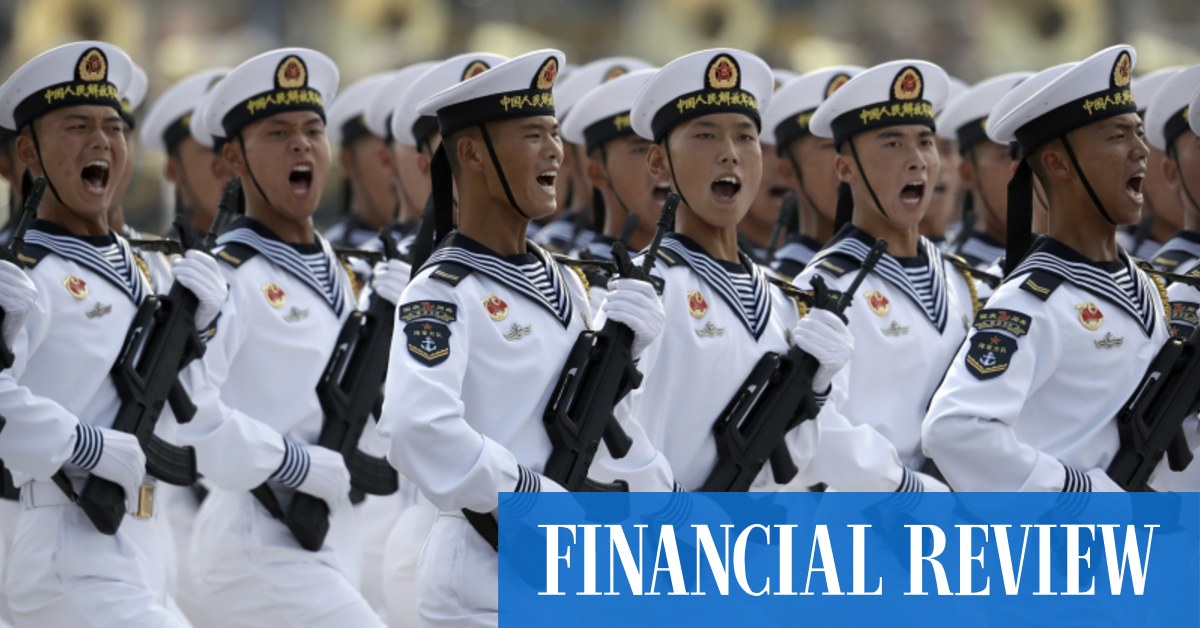In announcing the review, which will be co-led by former Labor defense minister Stephen Smith, Prime Minister Anthony Albanese said he expected defense spending to grow beyond the 2 per cent of gross domestic product benchmark to which the government had committed.

Sailors from China’s PLA Navy march for the 70th anniversary of Communist China. AP
Asked whether he thought conflict with China was inevitable, Mr Albanese said all needed to be done to advance peace and security in our region, which included building up the military.
“I firmly believe that one of the objectives front and center of having a strong defense of Australia is to make sure that we avoid conflict,” he said.
“That is the objective of this government. And I believe that’s the objective which the Australian people want to see. And this focus is very much on just that.”
The review will examine how prepared the Defense Force is for the security challenges of the next decade, looking at basing and location of forces, structure of the military and its capabilities, weapons platforms, infrastructure and logistics.
The review is due to report in March, in tandem with separate work on the submarine program.
It could mean personnel are relocated to bolster the northern approaches to the continent. Some projects could be canned or scaled back, others brought forward and new ones funded.
Committed to nuclear-powered submarines
The government, however, said it remained committed to the acquisition of nuclear-powered submarines and the troubled $45 billion Hunter class program was safe from the axe.
“The major programs which are under way are not about to change,” Defense Minister Richard Marles said.
“But we’re going to look at the integrated investment plan [which outlines $270 billion of planned military acquisitions] over the course of the next 10 years to make sure what we have as a schedule of procurements does meet the challenges that our strategic circumstances present.”
Mr Albanese and Mr Marles said the review was the most significant of the Defense Force in 35 years. It was required after the 10-year warning window of an attack on Australia, which has underpinned military planning assumptions, had shrunk as China became more assertive and the risk of state-on-state conflict rose, they said.
Long-range strike missiles
Former senior defense official Paul Dibb, who led the 1986 review that devised the 10-year warning window, echoed Sir Angus’ assessment.
He said the 10-year warning period reflected the window it would take a regional power to build up a force to invade Australia, and short of a nuclear strike, no potential adversaries had that capability at the time.
“Now we have a China that could put one of its aircraft carriers into the South China Sea and threaten us, not directly with military force, but coerce us and in Chinese Communist Party language, teach us a lesson,” Professor Dibb said.
“I would expect the reviewers to find this is dangerous, our warning time is zip and conflict could happen at any time.
“The answer is we need to get lots and lots of long-range strike missiles, with ranges in the thousands of kilometers, not hundreds. The nearest Chinese base is Fiery Cross Reef [about 3000km from Darwin]. We should have the capability to take that out.”
Professor’s appointment under fire
The appointment of Professor Smith, defense minister between 2010 and 2013, came under fire from the opposition and the Australia Defense Association.
Opposition defense spokesman Andrew Hastie said Mr Smith as minister presided over billions of dollars in cuts to the defense budget, with military spending plunging to 1.56 per cent of GDP, the lowest level since 1938.
“The Prime Minister has said this is the most complex strategic environment Australia has encountered – and what does he do? Appoint the man who oversaw the biggest cuts to defense in 70 years to review defense investment,” Mr Hastie said.
“When Mr Smith was last in government he cut and canceled defense projects, delayed decisions, and dismissed warnings about the strategic environment Australia was heading into a decade ago.”
While supportive of a review, ADA executive director Neil James said Professor Smith was the wrong person to co-lead it. This was because as a former minister, Professor Smith might engage in “legacy protection”.
Mr James said as a minister, Professor Smith was known for not making decisions, such as failing to commission any new naval vessels, contributing to delays in shipbuilding still being felt today.
One decision Professor Smith did make, canceling the acquisition of South Korean-made self-propelled Howitzer guns, was reversed several years ago.
Mr James said the Defense Department and Australian Defense Force were often unfairly criticised, and the review needed to look at how governments made decisions about the military.
